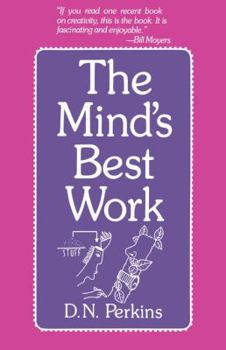The Mind's Best Work
Select Format
Select Condition 
Book Overview
Over the years, tales about the creative process have flourished-tales of sudden insight and superior intelligence and personal eccentricity. Coleridge claimed that he wrote "Kubla Khan" in one sitting after an opium-induced dream. Poe declared that his "Raven" was worked out "with the precision and rigid consequence of a mathematical problem."
Format:Paperback
Language:English
ISBN:0674576241
ISBN13:9780674576247
Release Date:January 1981
Publisher:Harvard University Press
Length:324 Pages
Weight:1.10 lbs.
Dimensions:0.9" x 5.5" x 8.2"
Customer Reviews
2 ratings
Propositions about how the mind creates
Published by Thriftbooks.com User , 20 years ago
This book is not about how to be more creative, but rather presents current (1981) research on creativity and how new ideas come about. Each chapter looks at a psychological processes making up creativity. Starting with a proposition, Perkins then presents facts and arguments that result in a revised proposition that more accurately portrays how the mind works. For example in chapter two the initial proposition is "Mental leaps depend upon on extended unconscious thinking", then after arguing that the subconscious plays less of a role in creativity the revised proposition becomes "Extended unconscious thinking does not occur. Deferring a troublesome problem and returning to it later occasionally helps for reasons that have nothing to do with extended unconscious thinking." By delving into these processes, Perkins demystifies creativity into a skill that can be learned as a balance of imagination and analysis.Along the way to a more final proposition are short mental exercises that provide the reader experience with the ideas. For example, on "searching for" there is an exercise on perceptual hill climbing that involves trying to perceive drawings. There are surprises and myth busting in many chapters, such as dispelling that the left-brain is scientific and right intuitive. Some useful examples of creativity presented include Darwin's "discovery" of natural selection, and Albert Einstein on simplicity of evaluating an idea. The example of "Instant Zen", presented a paradoxical example of field-specific generalizations and use of heuristics: not only showing its power but its limits. Although not generally a "how to" book; the chapter on heuristics presents more definite methods such as SQ3R (Survey, question, read, recite, review) as a plan for reading.
Thorough discussion from a scientific point of view
Published by Thriftbooks.com User , 25 years ago
Perkins dares to throw away laymen's theories about creativity, and supports his case with theoretical considerations as well as with examples from reality. Do not expect a simple book. Perkins discusses in great length scientific research in the creativity field, as opposed to the many "creativity cookbooks" you'll find.





